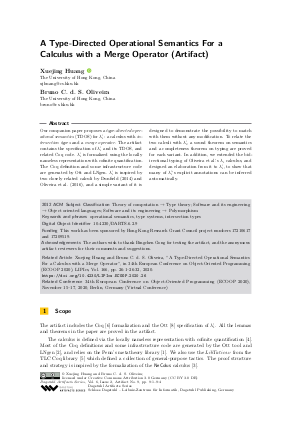@Article{huang_et_al:DARTS.6.2.9,
author = {Huang, Xuejing and Oliveira, Bruno C. d. S.},
title = {{A Type-Directed Operational Semantics For a Calculus with a Merge Operator (Artifact)}},
pages = {9:1--9:4},
journal = {Dagstuhl Artifacts Series},
ISSN = {2509-8195},
year = {2020},
volume = {6},
number = {2},
editor = {Huang, Xuejing and Oliveira, Bruno C. d. S.},
publisher = {Schloss Dagstuhl -- Leibniz-Zentrum f{\"u}r Informatik},
address = {Dagstuhl, Germany},
URL = {https://drops.dagstuhl.de/entities/document/10.4230/DARTS.6.2.9},
URN = {urn:nbn:de:0030-drops-132060},
doi = {10.4230/DARTS.6.2.9},
annote = {Keywords: operational semantics, type systems, intersection types}
}

 Creative Commons Attribution 3.0 Unported license
Creative Commons Attribution 3.0 Unported license



